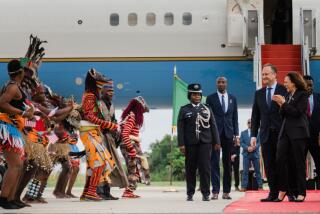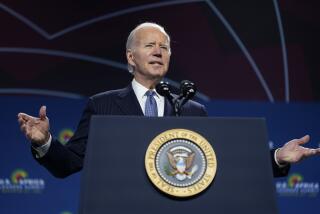All Too Easy to Forget, All Too Important Now : Oft-ignored Africa gets some needed attention from Washington
Many African nations are governed by one longtime ruler and a single party. These leaders for life typically come to power via independence movements against colonial powers or violent coups against other dictators. In spite of that pervasive tradition, the political climate is changing as demands for democracy grow stronger.
Vice President Dan Quayle, who is on a five-nation tour, is reinforcing those demands with his advocacy of multiple political parties and an end to human rights abuses.
MOVEMENT TOWARD DEMOCRACY: Quayle’s trip is timely because nearly a dozen African heads of state have lost power since the broad reform movement was sparked in the West African nation of Benin, where two years ago residents stoned Lenin’s statue. (In that prophetic sense, Benin was ahead of the political curve.) Benin’s military dictator, Mathieu Kerikou, was ousted in elections in March. More African leaders are expected to make the transition to power-sharing or risk losing their position through a civil war or coup.
Quayle’s visit is also important because it focuses attention on nations that have fallen even lower on the U. S. foreign policy agenda because of the end of the Cold War. Yet neither the absence of the Cold War nor any other war can alter the fact that Africa is the world’s second-largest continent and holds 15% of the world’s population. No matter what the world political situation, a continent of that mass and that many people can never be written off as irrelevant.
During decades of deadly rivalry with the Soviet Union, the United States backed African nations like Ethiopia to gain political advantage, despite their history of human rights horrors. Now that African nations are no longer viewed solely through the prism of Western geopolitical ambitions, the majority have become invisible internationally, with the exception of South Africa and its riveting movement toward universal suffrage and constitutional reform. By traveling to nations less familiar to the average American, the vice president focuses a much needed spotlight on the rest of Africa and emphasizes the importance of an often misunderstood continent.
THE U.S. EFFORT: Quayle stopped first at Cape Verde, a group of tiny islands (slightly larger than Rhode Island) situated nearly 400 miles off Africa’s west coast. Cape Verde is noteworthy because of its recent peaceful transition to democracy. Presidential and legislative elections put the incumbents out and ended 15 years of single-party domination.
In Nigeria, Africa’s most populous and oil-rich nation, Quayle met with Gen. Ibrahim B. Babangida. Although political dissent is rarely tolerated in this West African power, Babangida has planned a careful transition to civilian and democratic rule scheduled for next year.
Quayle encountered meaningless rhetoric in Malawi from President-for-Life Hastings Kamuzu Banda, 94, who runs the only legal political party in this impoverished nation in southeastern Africa. Banda deserves credit, however, for accepting more than 1 million refugees who fled the civil war in Mozambique.
At his next stop, Quayle praised Namibia’s successful democracy as a model for other nations in transition. Known as the continent’s last colony, this nation in southern Africa became free in March of 1990.
Quayle is expected to make his final stop today in the Ivory Coast. President Felix Houphouet-Boigny--the only president this West African nation has every known--has allowed multiparty elections for the first time in three decades. He won, but how much longer can this septuagenarian rule?
As dictators disappear in Africa, the United States can encourage democracy with attention and foreign assistance. Can President Bush find a place in his new world order for the usually left-out nations of Africa? The possibilities deserve further exploration. Let the Quayle trip be merely a first step of that new exploration.
More to Read
Sign up for Essential California
The most important California stories and recommendations in your inbox every morning.
You may occasionally receive promotional content from the Los Angeles Times.










